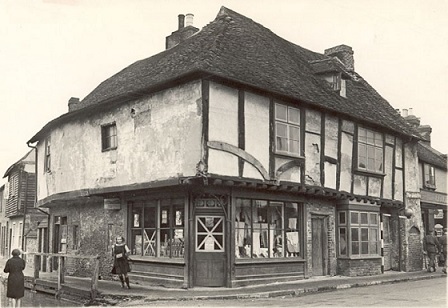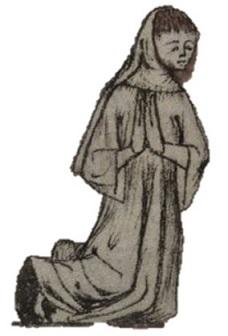A meeting with the Cistercian abbots
by Professor Nicholas Vincent
4 October 1215 - 10 October 1215
| Date | Place | Sources | Notes |
|---|---|---|---|
4 Oct 1215 |
RLP, 156b; RLC, i, 230 |
||
4-5 Oct 1215 |
RLC, i, 230 |
||
5 Oct 1215 |
RLP, 182b; RLC, i, 230 |
||
6 Oct 1215 |
RLC, i, 230-30b; Rot.Ob., 567 |
||
7-9 Oct 1215 |
RLP, 156b-57; RLC, i, 230b-31 |
||
9-10 Oct 1215 |
RLC, i, 231 |
From Newington on Sunday 4 October, the King returned via Canterbury to Dover by Tuesday 6th, then retraced his steps to Ospringe on the following Saturday. John was now officially at war, as his letters sent from Newington on 4 October proclaim, demanding that the castellans of the west country receive Fawkes de Breauté and do as he might command them with respect to 'guerram nostram'. At the same time, Fawkes was to win back to the King's fealty as many rebels as could be persuaded to defect.1 One of the first to do so was Giles de Braose, bishop of Hereford, who on 9 October received safe conducts in approaching the King to make peace.2 In Hereford itself and on the March, there was clearly fear of a Welsh attack. Hereford itself was placed under defence, under the leadership of Walter de Clifford the younger.3 On the same day, Robert de Bareville was sent the keys of the King's treasury at Dover, asked to take out 2000 marks and then reseal what remained of a clearly substantial treasure.4 The port of Romney was garrisoned, and commands were sent to the earl of Arundel to ensure proper defence of the castle and coast of Pevensey.5 Further Flemish mercenaries continued to land at Sandwich, at the King's expense, whilst the King made provision for custody of the land and daughter of his late mercenary captain, Hugh de Boves.6
At Canterbury, on Monday 5 October, there seems to have been an important meeting between the King and at least fourteen Cistercian abbots, presumably before these abbots embarked for France and their order's general chapter, convened at Cîteaux each year on 9 October.7 Various of the commands concerning land this week may have been routine. But not so the grant to William earl of Aumale of three manors seized from William Marshal the younger, nor the transfer to Hugh de Neville of custody over the manor of Cherhill in Wiltshire, formerly the possession of Geoffrey fitz Peter and hence of the rebel, Geoffrey de Mandeville.8 An order for the manor of 'Wikes' (perhaps Wick Rissington) in Gloucestershire, formerly the possession of Warin de Montchesney, to be granted to Walter de Lacy perhaps signals another major act of confiscation.9 As this should make apparent, and as opposed to the lists of 'reversi' at the end of the civil war in 1217, it is often difficult during these opening stages of hostilities to establish whether land was being transferred from rebels or merely as a result of the routine of tenure and inheritance. One man certainly not amongst the rebels was Walter de Dunstanville, a close associate of William Marshal, who on 9 October obtained letters of protection from the King.10
1 | RLP, 156b, and on the same day, note Fawkes' collection of 416 marks previously deposited in Oxford by the archbishop of Dublin. |
2 | RLP, 156b-7. |
3 | RLC, i, 231. |
4 | RLP, 157, and cf. further instructions to Robert to supply armour and arms from Dover: RLC, i, 230-1. |
5 | RLP, 156b-7. |
6 | RLC, i, 230, naming the castellan of Furnes, Saher de Breban (?Brabant), and John de Tingrye, and cf. p.231 for Gerard de Norhun, Baragh de Strep'. For Hugh de Boves, RLC, i, 230, including his land at Westcliffe (?Kent). |
7 | RLC, i, 230, orders to the abbot of Faversham to supply wine to the abbots of Rievaulx, Furness, Melrose, Wardon, Boxley, Dore, Tintern, Kingswood, Dieulacres, Thame, Poulton, Ford, Bindon and ?Stanley ('Straslu'). |
8 | RLC, i, 230b-1, and for Cherhill, VCH Wiltshire, xvii, 137-40. |
9 | RLP, 157, and for the Lacy lordship at Wick Rissington, VCH Gloucestershire, vi, 116-18, and what may have been further confiscations from Warin, RLC, i, 232b, 266b. For other commands concerning the land of Eustace de Burn', Roger Cressy, Ralph of Hastingleigh and James de Walle Bidonis in Kent, Thomas the Dane ('Dacus') in Jersey and Robert de Cresek in Sussex, see RLC, i, 230-30b. Michael de Columbers, who on 6 October 1215 fined 100 marks for custody of the Wiltshire forest of Chute, did so undoubtedly as heir to the previous keeper: Rot.Ob., 567; VCH Wiltshire, iv, 400. |
10 | RLC, i, 231. |
- February 1214 - June 1214 (1)
- June 1214 - July 1214 (3)
- July 1214 - August 1214 (4)
- August 1214 - September 1214 (5)
- John hears of Bouvines and reconsiders his position
3 August 1214 - 9 August 1214 - John plans his return to England
10 August 1214 - 16 August 1214 - John’s spies intercept a letter of Aimery of Thouars
17 August 1214 - 23 August 1214 - John refuses to abandon his French lands
24 August 1214 - 30 August 1214 - John grants a truce to Philip Augustus and seeks the release of William Longespée
31 August 1214 - 6 September 1214
- John hears of Bouvines and reconsiders his position
- September 1214 - October 1214 (4)
- Negotiations with Philip Augustus
7 September 1214 - 13 September 1214 - Peace with Philip Augustus
14 September 1214 - 20 September 1214 - John’s chancery staff departs for England
21 September 1214 - 27 September 1214 - John demonstrates his willingness to rule according to law
28 September 1214 - 4 October 1214
- Negotiations with Philip Augustus
- October 1214 - November 1214 (4)
- John prepares for his passage back to England
5 October 1214 - 11 October 1214 - John’s sea journey and landing at Dartmouth
12 October 1214 - 18 October 1214 - The regency government of Peter des Roches
19 October 1214 - 25 October 1214 - From the Tower, John sends a coded message to his queen
26 October 1214 - 1 November 1214
- John prepares for his passage back to England
- November 1214 - December 1214 (5)
- Drama and jokes at Bury St Edmunds
2 November 1214 - 8 November 1214 - The matter of episcopal elections
9 November 1214 - 15 November 1214 - John grants freedom of election
16 November 1214 - 22 November 1214 - John visits Wiltshire
23 November 1214 - 29 November 1214 - King John prepares for Christmas and intimidates electors
30 November 1214 - 6 December 1214
- Drama and jokes at Bury St Edmunds
- December 1214 - January 1215 (4)
- January 1215 (4)
- February 1215 (4)
- March 1215 - April 1215 (5)
- John takes the cross, on Ash Wednesday
1 March 1215 - 7 March 1215 - John's fears of French invasion abate
8 March 1215 - 14 March 1215 - John moves to secure the frontier zone
15 March 1215 - 21 March 1215 - John hunts in Nottinghamshire
22 March 1215 - 28 March 1215 - John prepares for trouble in the North
29 March 1215 - 4 April 1215
- John takes the cross, on Ash Wednesday
- April 1215 - May 1215 (4)
- May 1215 - June 1215 (5)
- 'our barons who are against us'
3 May 1215 - 9 May 1215 - 'by the law of our realm or by judgment of their peers'
10 May 1215 - 16 May 1215 - The rebels seize London
17 May 1215 - 23 May 1215 - John negotiates with the Pope and archbishop Langton
24 May 1215 - 30 May 1215 - Negotiation with the rebels
31 May 1215 - 6 June 1215
- 'our barons who are against us'
- June 1215 - July 1215 (4)
- July 1215 - August 1215 (4)
- August 1215 - September 1215 (5)
- September 1215 - October 1215 (4)
- October 1215 (4)
- A meeting with the Cistercian abbots
4 October 1215 - 10 October 1215 - John and the siege of Rochester: week one
11 October 1215 - 17 October 1215 - Rochester week two, the siege of Norham and the return of Giles de Braose
18 October 1215 - 24 October 1215 - John and the siege of Rochester: week three
25 October 1215 - 31 October 1215
- A meeting with the Cistercian abbots
- November 1215 - December 1215 (5)
- John and the siege of Rochester: week four
1 November 1215 - 7 November 1215 - John and the siege of Rochester: week five
8 November 1215 - 14 November 1215 - John and the siege of Rochester: week six
15 November 1215 - 21 November 1215 - John and the siege of Rochester: week seven
22 November 1215 - 28 November 1215 - The fall of Rochester Castle
29 November 1215 - 5 December 1215
- John and the siege of Rochester: week four
- December 1215 - January 1216 (4)
- January 1216 (3)

